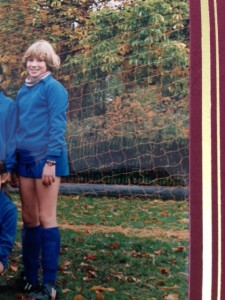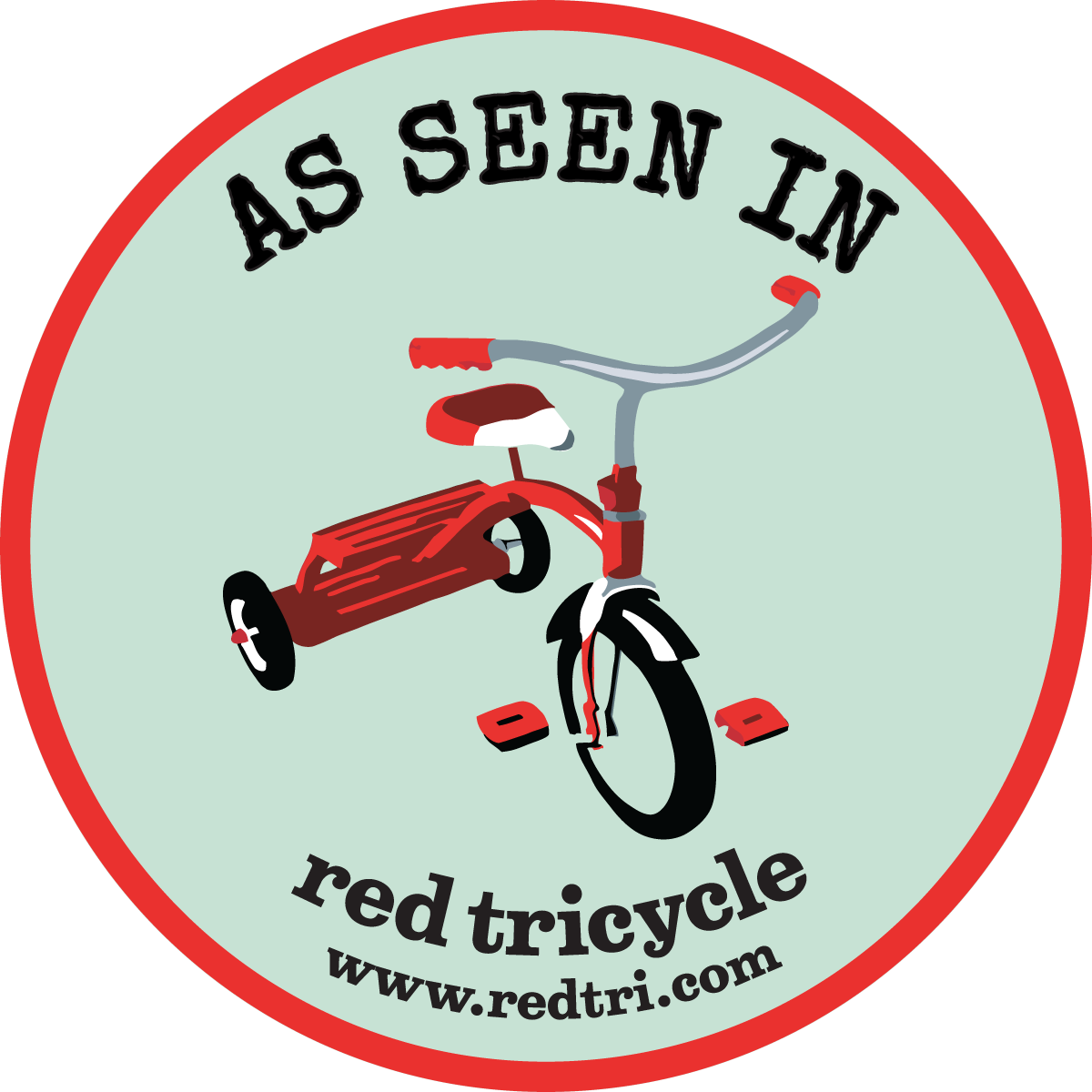“What’s average? Happiness first” tweeted Washington Post reporter Brigid Schulte, back to me. I had asked her “Who said average can’t also be awesome” in a previous tweet.
 I love social media (but I have no idea why her tweet is showing up so blurry in the image, #sorry).
I love social media (but I have no idea why her tweet is showing up so blurry in the image, #sorry).
I love the instant gratification from chatting with a reporter about the remarkable, insightful and important piece they have in the paper. In this case, I’m talking about Schulte’s piece “Pushing for a Course Correction” on the front page of today’s WaPo Style section. If you haven’t yet read it, I insist you do.
In case you have no intention of reading it, here’s why it matters. Because she’s talking about pretty much all of us. She features the McLean (VA) High School PTSA president Wilma Bowers who is doing something important, something brave and something I fear is falling on deaf ears – pushing for parents to ease up on the hyper-competitive parenting environment. She is asking us all to look at authentic success instead. And she’s doing this from a place where a quality college like James Madison University is considered a college you “settle” for instead of the Ivy Leagues.
Here’s the thing people, this is a line of thinking that doesn’t happen overnight, it starts from a very early age. You see it in kids who are over-scheduled, who have no time to play, who are expected to perform, achieve and deliver, sometimes from the time they are in preschool.
And if you’re anything like me, a part of you is smugly thinking that this won’t be you or that it isn’t you; you aren’t this kind of parent, you love your child for who they are and what their natural born abilities are.
But the truth is, be honest with yourself, are you lying to yourself just a little bit?
Example – the constant testing of early elementary school aged kids feeds into heart of our our need to tell ourselves our kids are better than average. Right now my oldest is nearing the end of second grade, which in Montgomery County means they are being tested for the gifted and talented program that begins in third grade.
She’ll come home and tell me they were tested that day and I’ll find myself asking her multiple questions about how she think she did, did she find it hard, what sorts of questions were on the test. These questions aren’t just innocent curiosity. I am trying to get a read on her performance. I would be totally lying to you if I didn’t want to hear she excelled and is a brilliant mind.
And then I kick myself.

Me around age 9 – rocking the awesome, right?
She is EIGHT YEARS OLD. What the hell was I doing when I was 8 years old? Obviously because I declared 2012 the year of being Awesome, I’m pretty sure I was busy being awesome when I was 8 years old – but beyond that – was I doing anything remarkable? Here’s what I can tell you I was busy doing when I was 8: Counting my tummy rolls next to my sister at the pool in the summer (she was always so much thinner than me), kicking around the soccer ball, maybe a little uncoordinated roller skating and avoiding helping my mom take care of my little sisters at all costs.
Yep – destined for greatness, was I, at 8-years-old.

A hand-made Halloween card I sent my Grandma, probably around age 9. Clearly I was a true prodigy. Also, the fact that my mom has all of these saved is probably a discussion for another day. #Hoarding?
So really – I need to ease up on the questioning of my daughter and just let her be. How about instead ignoring the questions about the tests and instead ask what she did at recess, the reasonable voice inside my head tells my crazy self.
Which is exactly why Schulte’s feature is important; she’s getting to the heart of the hyper-competitive parenting and pressure cooker it creates for high school aged kids. But it’s too late for them – she mentions kids who are asking their parents for Ritalin. Umm…hello?!?!?!?! Red flags, anyone?!??!
If we parents of younger kids don’t read this and take a long, hard, look at ourselves in the mirror and then start correcting our course to stop the madness, then there is definitely something very very wrong with us. In fact, I’m done writing about and talking about whether women can “have it all” and our quest for balance – forget it – what I want to know is what kind of behavior we are modeling for our kids. Are we letting them have it all? Are we letting them just be kids? And how about that average question.
Are we letting them just be who they are? I have never forgotten an interview I did with Meghan Leahy, local parenting coach, back in 2012 when she noted there’s a bell curve for a reason and most of us have average kids. Most of us are average. To Schulte’s point in her tweet, “what’s average, happiness first.”
I dug up that old interview with Leahy and was pleasantly surprised to stumble upon some irony, the interview was spurred by my negative reaction to a Brigid Schulte piece about American parenting. Am I destined to always praise or attack Schulte? It seems so. Anyhow, the interview is 2 years old but it still applies perfectly here, so I’m pasting it:
WM: You know that I’ve themed 2012 the year of
Moi Loves Moi on my blog because I am just so tired of women beating themselves up. It doesn’t do anyone any good, starting with their own confidence and how that spills over into their kids. What I did appreciate about Schulte’s piece was her discussion towards the end about our pursuit of happiness and being an achievement-centered culture.
When we last worked together on a post you made a point that really resonated with me – you commented that there is a bell curve for a reason and most of our kids are average – and we should celebrate our kids for who they are. Can you say some more about this because I think it’s
relevant here. Do you agree that we are a culture that pushes perfection on kids to the detriment of the kids as they grow up? And if studies are finding achievement does not lead to happiness, how does this concept that pushing kids to work hard and celebrate their diligence – instead of heaping empty praise – fit in here?
Meghan Leahy Response: Interesting questions here…I am thinking that achievement IS good for our kids, except I would rephrase achievement as “Giving back” or doing something significant. Something tangible in the world. You can achieve great and amazing things, but
if as a person, you feel that you have no impact, no human to human contact, no acknowledgement, you often feel empty. So the question for parents is not if achievement leads to happiness (which I prefer to call contentment), rather WHOSE achievement is it…and how do we balance our dreams with our kids own desires, passions, and talents. We want to inspire INTRINSIC motivation in our kids to achieve, work hard, etc. Threatening, begging, REWARDING, stone-walling can all push our kids down the path of achievement, we see it every day. But there is a cost. There is always a cost when the body does what soul does not want. I don’t know if parents are living out their unfilled dreams, their insecurities, or if they see a talent in their child and, out of pride (dangerous emotion), push and push. But some, not all, parents make their children into achievement products rather than helping them enter into the world understanding the value of hard work and failure.
WM Question: Excellent insight. I think it’s really important that as parents, we do take the time to acknowledge what our kids want instead of what WE want them to want. Schulte interviewed some experts who noted that we should be parenting for happiness first and then achievement. But it seems to me these things are not mutually exclusive. If American parents are pushing achievement on their kids by over scheduling them with activities – then do you think instead of focusing our energy on seeking the elusive work-life balance for ourselves – what we
instead should be prioritizing is teaching and guiding our kids to find the right kid-balance? How does a parent strike the right balance in activities and free time? This seems to be a common critique of American parenting styles lately.
Meghan Response: Wow, great questions. So, if you promote balance in your children’s lives, but you yourself are running around like a maniac, never taking care of yourself, martyring yourself at every turn, allowing your mental health and body to suffer…your children see all of that. So, like the child who is lectured to be honest and good and then sees his parents cheat on each other, lie to others, be dishonest in their business dealings…what lesson remains? Hypocrisy, for sure, and the child will almost always follow the role model, not the lecture. As I learned at PEP (The Parent Encouragement Program), children are “keen observers and poor interpretors”; meaning they are WATCHING their parents for how to live. Do you kiss your spouse? Do you see friends? Do you work in something that brings you joy? Are you responsible with money? So, if you want your children to value being quiet in themselves here and there, being creative, NOT constantly being entertained, living stress-free, the PARENT is the only person who can model that and create the home environment. We cannot inundate our children with activities and then wonder why they are stressed. The same is true for us. If we accept every volunteer opportunity, work opportunity, party invite, etc. what are we modeling? “I say yes. To everyone. Above my family. Above my spouse. Above myself.” This is a “slow-death” life, pick-pick-picking away at you. So, the balance MUST begin with the parent. They cannot model what they do not live, they cannot give what they don’t have. And beyond wanting your child to live according to his or her own values, every parent is a human and deserves to not run around like a wild person. What is the point of life?
WM Question: Really excellent perspective, I appreciate it. Final question: Schulte’s experts say that the cortex of fear for American parents is around achievement. And I admit, I regularly have to check myself with just my kindergartener. She’s reading a grade level above yet I don’t think she is in the most advanced reading group in class – and I often have to have a conversation with myself that I am being ridiculous. Do you see this and what is your advice for parents to keep themselves in check? I can obviously see how this grows deeper as the kids age and the stakes are higher.
Meghan Response: Oh, it’s hard. Parents are constantly being told to relax or be vigilant. We are told that kids develop on their own and in their own way, but watch (like a hawk) so the kids can get early interventions (just in case). We are given pre-natal care out the ying-yang, but are dropped like hot-potatoes when we leave the hospital (which the following weeks are some of the most harrowing ever in a woman’s life).
We are successful, career-minded women who gave up “something” to sit on the floor and color and so we watch the child. We watch our new investment, our new project, our new career. We wanted to be good students, good lawyers, and now good mothers. But it doesn’t work out that way. No one gives you grades, there are no job reviews, no raises, and no corner offices. Hell, the kid throws food in your face when you have puree organic mango. That’s the thanks you get for putting your life on hold. So, when you have your little reader (who is clearly doing fine), and you worry, you need to ask yourself, “Who am I worried about here?” And “Are my worries grounded in REALITY?”
No, they are not. Because if they were, that would mean that the definition of being a great mom is that your child MUST BE THE BEST AT EVERYTHING. Good grief. Can you imagine? Who will have the mental breakdown first, you or the kid?
Parents need to understand there are no guarantees. Yes, of course, you set your family on a path and you should. That’s your job. But schools, activities, tutors, beauty, athleticism, money…you can throw it all at your kids physically or genetically and, sorry, still no guarantees. Life is too complicated and wonderful for that. That would mean kids with little resources would never succeed, and kids who have everything should live out beautiful lives and marriages (cough, cough, that ain’t happening).
As the saying goes “Sh#t happens” and that is wonderfully comforting. This means that a parent can say “I am going to read this book to you because I love books, and it is good for your brain, and this is wonderful being together.” NOT “We are reading this book so you can get a jump on nursery school and go to Princeton like your father.” Because Princeton is not a guarantee. Your commitment to living an authentic life as human, caring about VALUES like hard-work, diligence, and yes, achievement (not JUST for your kids, for YOU), your willingness to make mistakes and move through them (achievement MUST come with errors, otherwise it is a gimme and then, not an achievement), and above all, LOVE is what keeps a parent in check. The voices in your head will tell you to worry and fear, but if you trust your own judgement, you
will know when concern and action are needed and when you are just wallowing in negative thinking. REALITY doesn’t lie, so trust what is in front of you, your actual life. Your life doesn’t need balancing, it is simply happening and needs to you to join in. If every parent took more responsibility for themselves (emotionally) and spent LESS attention worrying about their kids (yes, you read that right), then the balance would naturally occur. At least, that’s my humble opinion. Because if worrying, hand-wringing, and controlling others worked, I would have a PhD in it, would have written a book and would be teaching seminars about how to worry better. So far, it hasn’t gone that way…
I think a favorite quote of mine is really applicable here: “Your life is not in your head. Come out and play.” ~Baron Baptiste
WM: Wow. Excellent perspective from Meghan, as we would only expect. Thank you so much, Meghan, for taking the time to answer my questions. If you want to hear more of Meghan’s thoughts and insights, be sure to
“Like” the Meghan Leahy Parenting Coach Facebook page. And as always, if you haven’t
“Liked” the Wired Momma Facebook page, you are most definitely not balanced and most definitely missing out.
—————————————-
Thank you to
Brigid Schulte for today’s WashPost piece – and obviously I had to check myself when my daughter was in Kindergarten and I still do now that she’s in second grade. I need to go look into bringing this authentic success movement to our local elementary school.
 I love social media (but I have no idea why her tweet is showing up so blurry in the image, #sorry).
I love social media (but I have no idea why her tweet is showing up so blurry in the image, #sorry).








This is such a tough one for me, not because I think my child is brilliant (although of course I do), but because I am competitive by nature. Even about things I don’t really care about. I have to stop myself from taking her to be tested, “just to see”, because you know what? We can’t afford private school no matter what her scores are. And because I really, truly believe the at kindergarten, the IQ tests are ridiculous and possibly harmful. To me, if not to her.